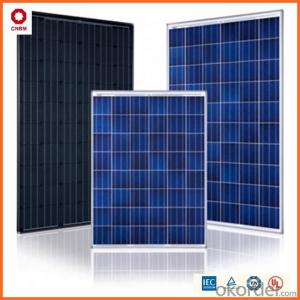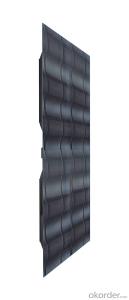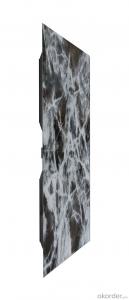25w Small Solar Panels with Good Quality
- Loading Port:
- China main port
- Payment Terms:
- TT OR LC
- Min Order Qty:
- 1 watt
- Supply Capability:
- 10000000 watt/month
OKorder Service Pledge
OKorder Financial Service
You Might Also Like
Item specifice
Product Description:
Hot Sale !!! Quality and Safety of Small Poly Solar Panel 35~85w
1. Rigorous quality control meets the highest international standards.
2. High-transmissivity low-iron tempered glass, strong aluminium frame.
3. Using UV-resistant silicon.
4. IS09001/14001/CE/TUV/UL
Warranties of Small Poly Solar Panel 35~85w
1. 10 years limited product warranty
2. 15 years at 90% of the minimal rated power output
3. 25 years at 80% of the minimal rated power output
Specification
Characteristics of Poly solar panels CNBM (245-320W) | |||||
Max Power Voltage Vmp(V) | 30.3 | 30.8 | 31.1 | 31.4 | 31.85 |
Max Power Current Imp(A) | 7.60 | 7.64 | 7.73 | 7.81 | 7.85 |
Open Circuit Voltage Voc(V) | 36.1 | 36.6 | 37 | 37.3 | 37.68 |
Short Circuit Current Isc(A) | 8.50 | 8.55 | 8.65 | 8.75 | 8.85 |
Max Power Pm(W) | 230W | 235W | 240W | 245W | 250W |
Temperature Coefficient of Cells Poly solar panels CNBM (245-320W) | |
NOCT | 45± 2 |
Temperature Coeffucients of Isc | 0.0492 |
Temperature Coeffucients of Voc | -0.3374 |
Temperature Coeffucients of Voc | -0.4677 |
Mechanical Data of Poly solar panels CNBM (245-320W) | |
Dimension | 1638 × 982 × 40 mm |
Weight | 19.5 kg |
No. of Cells and Connections | 60 (6 ×10) |
Tolerance | 0 ~ + 5 W |
Cell | Monocrystalline Cell 156 × 156 mm |
Packing | 624 Pcs/40ft(H) Container |
Limits of Poly solar panels CNBM (245-320W) | |
Operating Temperature | -40 to +85 |
Storage Temperature | -40 to +85 |
Max System Voltage | 1000VDC(IEC) / 600VDC(UL) |
Features of our products:
• High conversion efficiency mono/poly-crystalline amorphous silicon solar cells
• Modules incorporate high performance bypass diodes to minimize the power drop caused by shading
• High transmittance, low-iron tempered glass
• High performance EVA encapsulant to prevent destroying and water.
• AI frame: without screw, corner connection. 8 holes on the frame can be installed easily
• Good performance of preventing from atrocious weather such as wind and hails
• Certifications: CE IEC TUV VDE UL, Class I
• 10 years 90% power output warranty

Shipping of Small Poly Solar Panel 35~85w
By Sea | Delivery from Shanghai or Ningbo seaport |
By Air | Departure from Shanghai Pudong Airport |
By Express | Post by DHL, EMS, UPS, TNT. |
- Q:What is the lifespan of solar panels?
- The average lifespan of solar panels is typically around 25 to 30 years, although some panels can last even longer with proper maintenance and care.
- Q:Can solar energy systems be installed on military bases or installations?
- Yes, solar energy systems can be installed on military bases or installations. In fact, many military bases have already embraced solar energy as a sustainable and cost-effective solution. These systems not only help reduce dependence on fossil fuels but also enhance energy security and resilience for military operations. Furthermore, solar installations on military bases contribute to the overall goal of transitioning towards renewable energy sources and reducing carbon emissions.
- Q:Can a solar energy system be installed in an apartment or rental property?
- Yes, a solar energy system can be installed in an apartment or rental property. However, there are a few considerations to keep in mind. Firstly, you need to check with your landlord or property owner to see if they are open to the idea of installing a solar energy system. Some landlords may be supportive of green initiatives and may even be willing to help with the installation costs. Others may have restrictions in place, so it is important to have a conversation with them before proceeding. Secondly, the feasibility of installing a solar energy system in an apartment or rental property will depend on the availability of suitable space for solar panels. In most cases, this would be the rooftop of the building. If the rooftop is shared among multiple tenants, you will need to discuss with them and obtain their consent as well. Additionally, it is important to consider the legal and financial aspects. You may need to consult with a solar energy contractor to assess the technical feasibility and cost of installation. Furthermore, you should investigate the laws and regulations in your area regarding solar installations on rental properties, as there may be specific requirements or permissions needed. Lastly, if you are a tenant, you need to consider the length of your lease. Installing a solar energy system is a long-term investment, and it may not be financially viable if you plan to move out before the system has paid for itself through energy savings. In summary, while it is possible to install a solar energy system in an apartment or rental property, it is important to have open communication with your landlord, consider the availability of suitable space, evaluate the legal and financial aspects, and consider the length of your lease before proceeding.
- Q:Can solar energy systems be used for powering electric car wash systems?
- Solar energy systems have the capability to operate electric car wash systems. Utilizing photovoltaic panels, solar energy systems convert sunlight into usable electricity. This electricity can then be employed to power a variety of electrical devices, such as car wash systems. By strategically placing solar panels on the roof of a car wash facility or a nearby structure, the generated solar power can be directly harnessed to operate the electric motors, pumps, and other necessary equipment for a car wash system. This not only diminishes the dependence on traditional grid electricity but also aids in reducing operational expenses and minimizing the carbon footprint of the car wash facility. Moreover, solar energy systems have the ability to store surplus energy in batteries, ensuring uninterrupted operation even during periods of limited sunlight or at night.
- Q:Can solar energy systems be used in powering research laboratories or scientific facilities?
- Yes, solar energy systems can be used to power research laboratories or scientific facilities. Solar panels can be installed on the roofs or grounds of these facilities to convert sunlight into electricity. This renewable energy source can provide a sustainable and reliable power supply, reducing dependence on traditional electricity grids and minimizing the carbon footprint of these facilities. Additionally, solar energy systems can be integrated with battery storage solutions to ensure continuous power supply even during periods of low sunlight or power outages.
- Q:What is the role of solar energy systems in reducing heat island effect?
- Solar energy systems can play a significant role in reducing the heat island effect by providing clean and renewable energy, thus reducing the reliance on fossil fuels and associated heat emissions. Additionally, solar panels help to shade surfaces, reducing their absorption of solar radiation and lowering surface temperatures. By utilizing solar energy, we can mitigate the urban heat island effect and create more sustainable and cooler urban environments.
- Q:How do solar energy systems contribute to reducing carbon emissions?
- Solar energy systems contribute to reducing carbon emissions by harnessing the power of the sun and converting it into electricity without producing any greenhouse gases. This clean and renewable source of energy replaces the need for fossil fuel-based power plants, which emit large amounts of carbon dioxide and other pollutants into the atmosphere. By adopting solar energy systems, we can significantly decrease our reliance on fossil fuels and mitigate the harmful effects of climate change.
- Q:How does the efficiency of solar panels vary with temperature?
- Solar panels experience a decline in efficiency as temperature rises, as opposed to being directly proportional. This is because solar panels convert sunlight into electricity using the photovoltaic effect. When temperature increases, the solar cells' electrons gain more energy, resulting in increased electron movement and resistance within the panel. Typically, solar panel efficiency is measured by comparing their power output to the amount of sunlight received. As temperature rises, the power output of solar panels generally decreases, leading to reduced efficiency. This decrease in efficiency is referred to as the temperature coefficient. The temperature coefficient quantifies the percentage change in power output for every degree Celsius increase in temperature. It is customarily expressed as a negative value, indicating the decline in efficiency as temperature rises. Different types of solar panels exhibit varying temperature coefficients that can range from -0.2% to -0.5% per degree Celsius. To counteract the efficiency decline caused by higher temperatures, solar panels are often designed with cooling mechanisms or situated in well-ventilated locations. These measures aid in dissipating excess heat and maintaining a more favorable operating temperature, ultimately enhancing the overall efficiency of the solar panels. In conclusion, the efficiency of solar panels diminishes with rising temperature due to the temperature coefficient. It is crucial to consider temperature effects when designing solar panel systems and implement measures to mitigate the decline in efficiency caused by higher temperatures.
- Q:Can solar energy systems be used for powering wineries?
- Certainly, wineries can make use of solar energy systems to power their operations. Solar power is an eco-friendly and renewable energy source that can offer a consistent and dependable supply of electricity for winemaking activities. Various processes in wineries, including grape crushing, fermentation, cooling, bottling, and storage, demand a substantial amount of energy. On that note, by installing solar panels, wineries can produce their own electricity, reducing their dependence on fossil fuels and decreasing their carbon footprint. It is possible to install solar energy systems on winery buildings' rooftops or in nearby open spaces like vineyards. These systems consist of solar panels that convert sunlight into electricity using the photovoltaic effect. The generated electricity can be directly used to power winery operations or stored in batteries for later use, ensuring a constant power supply even during cloudy days or at night. One of the significant advantages of adopting solar energy in wineries is the potential for long-term cost savings. Although the initial installation cost of solar panels may be relatively high, the operational expenses are considerably lower compared to conventional energy sources. Once the solar system is in place, wineries can enjoy reduced or even eliminated electricity bills, resulting in substantial savings over the system's lifespan. Furthermore, solar energy systems for wineries can be customized to meet specific energy requirements. By conducting a thorough energy assessment, wineries can determine their electricity demand and tailor the solar system accordingly. This allows wineries to have a personalized solution that fulfills their energy needs and ensures optimal performance. Besides the financial and environmental benefits, employing solar energy in wineries can also enhance their brand image and reputation. With consumers becoming increasingly conscious of sustainability and environmentally friendly practices, wineries that demonstrate a commitment to clean energy can attract eco-conscious customers. As a result, this can lead to increased sales and customer loyalty. In conclusion, solar energy systems present a practical and efficient option for powering wineries. By harnessing the sun's power, wineries can reduce their reliance on conventional energy sources, cut down on operating costs, and contribute to a greener and more sustainable future.
- Q:What are the advantages of using solar energy?
- There are several advantages of using solar energy. Firstly, it is a renewable and abundant source of energy, meaning it will never run out. Solar energy is also environmentally friendly as it does not produce any harmful emissions or pollution during operation. Additionally, solar energy can help reduce electricity bills as it allows homeowners and businesses to generate their own electricity. It also provides energy independence, as it reduces reliance on fossil fuels and the grid. Moreover, solar energy systems are low maintenance and have a long lifespan, making them a cost-effective investment in the long run. Overall, the advantages of using solar energy include sustainability, environmental benefits, cost savings, and energy independence.
1. Manufacturer Overview |
|
|---|---|
| Location | |
| Year Established | |
| Annual Output Value | |
| Main Markets | |
| Company Certifications | |
2. Manufacturer Certificates |
|
|---|---|
| a) Certification Name | |
| Range | |
| Reference | |
| Validity Period | |
3. Manufacturer Capability |
|
|---|---|
| a)Trade Capacity | |
| Nearest Port | |
| Export Percentage | |
| No.of Employees in Trade Department | |
| Language Spoken: | |
| b)Factory Information | |
| Factory Size: | |
| No. of Production Lines | |
| Contract Manufacturing | |
| Product Price Range | |
Send your message to us
25w Small Solar Panels with Good Quality
- Loading Port:
- China main port
- Payment Terms:
- TT OR LC
- Min Order Qty:
- 1 watt
- Supply Capability:
- 10000000 watt/month
OKorder Service Pledge
OKorder Financial Service
Similar products
New products
Hot products
Related keywords






























